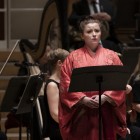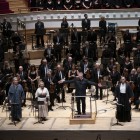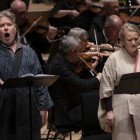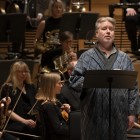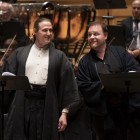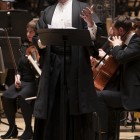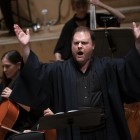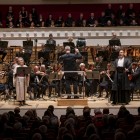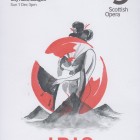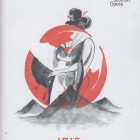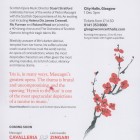Iris 2019Scottish Opera
Read more about the opera Iris
Mascagni's Iris, launched in 1898 with an exotic but grim Japanese setting, never really recovered any kind of popularity after Puccini's more user-friendly and picturesque Madama Butterfly appeared in 1904. In recent years Iris has had a couple of runs in London at Opera Holland Park, but this represents its Scottish premiere. On the basis of a first hearing of quite superb quality its continued neglect seems completely inexplicable. Iris contains many passages of absolutely thrilling accomplishment, that show the composer developing hugely from his justifiably still famous Cavalleria Rusticana.
Stuart Stratford has already shown his strong identification with operas of the verismo school and this composer in particular. Unusual features of the work include the opening and closing sequences - A solo double bass begins and slowly activity spreads over the orchestra, with a solo cello melody of beguiling character. As the dawn breaks, brighter instruments are heard, culminating in a blaze of sound from the chorus, capped with brass fanfares. A similar sequence at the end is even more affecting as Iris greets the new dawn before expiring. Perhaps Mascagni was influenced by the effect of similar massed choruses at the beginning and end of Arrigo Boito's now neglected Mefistofele, composed thirty years earlier.
The cast of principals was strong, with this season's Scarpia (Roland Wood) as Kyoto being joined as Osaka by Ric Furman, who made a strong impression as Boris in last season's Kátya Kabanová. He was required to produce a stream of heroic and high flying sounds to depict a far from heroic character - Is he even worse than Pinkerton? The bass James Creswell made an impact as last season's Sarastro, and now returned as Iris's blind father. These all faced vocally demanding parts. There was also a prominent solo for soprano Charlie Drummond, as a geisha. She had a sweet-toned aria ending the first act and a vocalise accompanied in oriental style that opened the second. Aled Hall, recently with the company as Spoletta in Tosca, was luxury casting as the leader of the reg pickers.
The title role is long and highly demanding, musically and dramatically. As with Butterfly, Salome and several other parts, a juvenile character is required to perform with a voice of far more powerful tone. During rehearsals, many of the artists suffered from various forms of the cold and flu that were going round. Helena Dix, who had herself joined the cast only at the start of rehearsals, was the last to be affected. As a precaution, the company brought to Glasgow a second Europe-based Australian soprano in Kiandra Howarth, formerly on the Royal Opera's Jette Parker young artist's programme. She was available and able to learn the part in one day of intensive work with Stuart Stratford and Derek Clark. The only concession made to this circumstance was the abandonment of the planned staging by Roxana Haines. The soloists all lined up across the stage with their music stands - though most of them were sufficiently routined not to need to refer to them. Appropriate Japanese-looking costumes had no doubt been liberated from the wardrobe department's various previous stagings of Madama Butterfly.
It has to be said that the results were quite astonishingly good. Of the expected sense of unease if not actual panic in the massed forces there was simply not a trace. The afternoon passed in a sense of joyous discovery of what is perhaps the composer's masterpiece. Of all the rare works Scottish Opera has revealed to us in these recent seasons, Iris seems likely to be one of the first to return in a full staging, ideally with the same participants.
Scottish Opera's 2019/20 Season
The season opened at the Edinburgh International Festival with the European premiere of Breaking the Waves by Missy Mazzoli. The autumn performances got under way with a visit to the Lammermuir Festival on 20 September with a single performance in concert of an unusual double bill - Mascagni's Zanetto and Wolf-Ferrari's Susanna's Secret. The main Glasgow season opened with an overdue and welcome revival of the company's vintage Tosca. There was a Sunday afternoon concert of Iris, another rare work by Mascagni. In the New Year there are new productions of Nixon in China by John Adams as well as Britten's Midsummer Night's Dream. and Sullivan's Gondoliers. Further concerts include a pairing of Mascagni's Cavalleria Rusticana with Leoncavallo's Zingari. There are also concert performances of a late Sullivan piece, Utopia, Limited, as well as the usual Opera Highlights tour of the Highlands and Islands.
Performance Cast
- Iris
- Il Cieco the Blind Man, Iris's father
- Osaka a rich and dissolute young man
- Kyoto keeper of a geisha house
- Dhia a Geisha
- First rag picker leader of the scavengers (il cenciaiulo)
- Second rag picker
- Third rag picker
